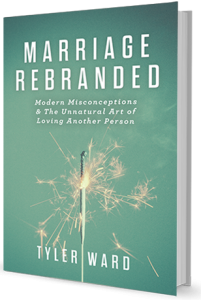Love is a burning flame. – J Cash, Ring of Fire
I broke up with my wife twice while we were dating. That often comes as a shock to those close to us, particularly because they can’t figure out why she dated me in the first place. I can’t either.
She was everything I wanted—everything I had dreamed of in a woman. Electric personality. Exotically gorgeous. Well-travelled. The uncanny ability to light up a room. A faith that was real and seasoned. The strength of conversation (she kept it going so I didn’t have to). The list went on, and as it did, I became more and more convinced I wouldn’t mind spending the rest of my life waking up next to her.
Yet, even then, I broke it off twice. Why? (I feel two-thirds embarrassed and one-third extremely embarrassed to admit this)
Because it wasn’t easy.
That was it: our dating relationship wasn’t easy. There were people who didn’t support us. There were doubts of compatibility. There were my trust issues that consistently complicated out ability to simply enjoy each other. And all of it was on top of the terrible idea I adopted somewhere along the way that if the Divine was behind the relationship, it would be easy, natural, and stress-free.
One month and a couple days into our second break-up, I came to grips with the fact that my ideas about the ease of love were not only getting in the way of the relationship I wanted, but they were also misguided. I jumped in my truck, drove from LA to Nashville in 24 hours, showed up on Analee’s doorstep, and proposed three days later.
Why the turn-around? Because love isn’t, in fact, designed to be easy. And anything worth loving is worth fighting for.
Anyone who has been lucky enough to brave the commitment of marriage knows the journey can be hard. And though every marriage comes with its own unique bag of challenges, perhaps theres a deeper, more universal reason love often comes with its share of difficulty.
MARRIAGE IS FIRE…
It all started when the first human on earth decided to name his wife after a hazardous chemical reaction. According to Biblical history, after having just been introduced to the only other human being on earth, Adam says, “She shall be called woman [Hebrew word: ishshah], because she was taken out of man [Hebrew word: ish].” (*special thanks to Jared Black for introduction to these original meanings)
Ish and Ishshah. I assume these names won’t be topping your list of names for future kids (although they do have a certain ring to them). Even so, they paint a picture about marriage that answers why marriage can be hard.
To start, both words are derived from the root Hebrew character esh, which means fire.
This means that the original word picture we have for the relationship between a man and a woman is an all-consuming, tireless-in-nature, potentially hazard-creating fire. And though this picture lends itself to the modern concept of heated romance or passionate love, the Bible consistently points to a different purpose of fire.
Fire happens to be one of the Bible’s primary metaphors for purification and personal development. Just to name a few examples…
- Jesus promised us “everyone will be salted with fire.”
- God points to the purpose of fire when He says, “I will put [them] into the fire, and refine them as one refines silver.”
- King David alludes to the intention of fire when he reflects in the Psalms, “We went through fire and through water, yet you brought us out into a place of abundance.”
If the relationships between two spouses really is “fire” as the Hebrew language suggests, it would seem its purpose—in line with biblical teaching—is personal refinement, designed to play a significant role in any spouses process of maturity and growth.
I can practically hear your protests, but hang with me—the biblical picture gets better.
…FIRE IS HEALING…
What if the fire (read: conflict) of marriage—as uncomfortable as it can sometimes be—is only a means to an end? Paul the apostle seems to think this might be the case. And he shows us how when he compares love in marriage to the love Jesus shows humanity.
He says (emphasis mine):
Husbands, love your wives, just as Christ also loved the church and gave Himself up for her, so that He might sanctify her [literally, purify her internally by the reformation of her soul], having cleansed her by the washing of water with the word . . . having no spot or wrinkle or any such thing; but that she would be holy and blameless.
Consider the implication of what Paul is saying here. Marriage, with all it’s good, bad, and ugly is a tool intent on the personal reformation of each party.
This idea was beautifully expressed in a recent Orthodox Christian wedding I attended. During the ceremony, the priest acknowledged Jesus did everything He did—including death on a tree—for our salvation. Then the priest looked at the couple and, borrowing Paul’s comparison of marriage to Jesus’ love, said:
“You’ve been given to one another for the other’s salvation.”
He continued: “Not salvation in the sense that only-Jesus-can-save,” the priest clarified, “but the kind of salvation that’s alluded to by the original Greek word soteria— meaning one’s holistic healing, deliverance, and prosperity.”
Now that sounds like a love worth fighting for.
If we think about marriage this way—as holistic healing, deliverance, prospering, and growth for both you and your spouse—it changes the way we feel about the difficult things we have to face because of and in spite of our spouse. We can experience the fires and conflicts of marriage differently by embracing the ancient reality of Soteria—that this unnatural relationship is a sort of Divine tool to help us become more beautiful—increasingly our best and brightest selves.
…AND HEALING CAN BE HARD.
I know the fire of marriage isn’t the recipe for a nice relaxing, easy life. I know that marriage is the greatest source of both enjoyment and challenge we can experience in life. I know, at times, it can demand far more than we feel ready to give.
I also know marriage multiplies what we can become—both as individuals and as couples.
Marriage, though arduous as times, has brilliant intentions in mind. It’s unapologetically interested in chipping away at our dysfunctional thoughts, patterns, and postures in life and inviting us—and our spouses—to become the best version of ourselves.
This vision of marriage takes the expectation off of our spouses to make us happy and re-creates the expectation that our marriage exists to help us grow.
It turns our focus from personal fulfillment to mutual personal development.
It exchanges our goal of happiness for the far more valuable goal of wholeness.
Question: Whats one way you’ve seen your spouse make you a better person, parent, or friend?
 Also, I explore more about the fire of marriage in my book, “Marriage Rebranded: Modern Misconceptions & the Unnatural Art of Loving Another Person,” where I debunk modern myths about marriage, tell awkward stories, and offer unorthodox best practices that could help anyone write a better marital narrative for themselves. Get more info or watch the video here.
Also, I explore more about the fire of marriage in my book, “Marriage Rebranded: Modern Misconceptions & the Unnatural Art of Loving Another Person,” where I debunk modern myths about marriage, tell awkward stories, and offer unorthodox best practices that could help anyone write a better marital narrative for themselves. Get more info or watch the video here.


Pingback: It’s Not About Need, It’s About Want | bookscoffeeandtherabbithole()